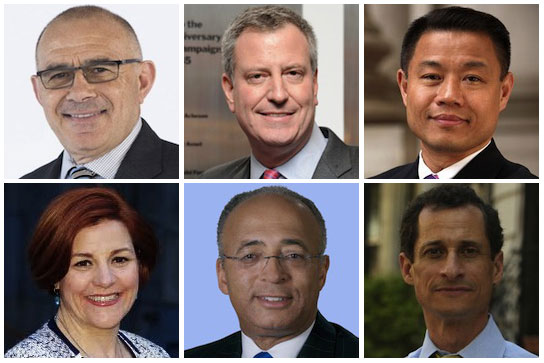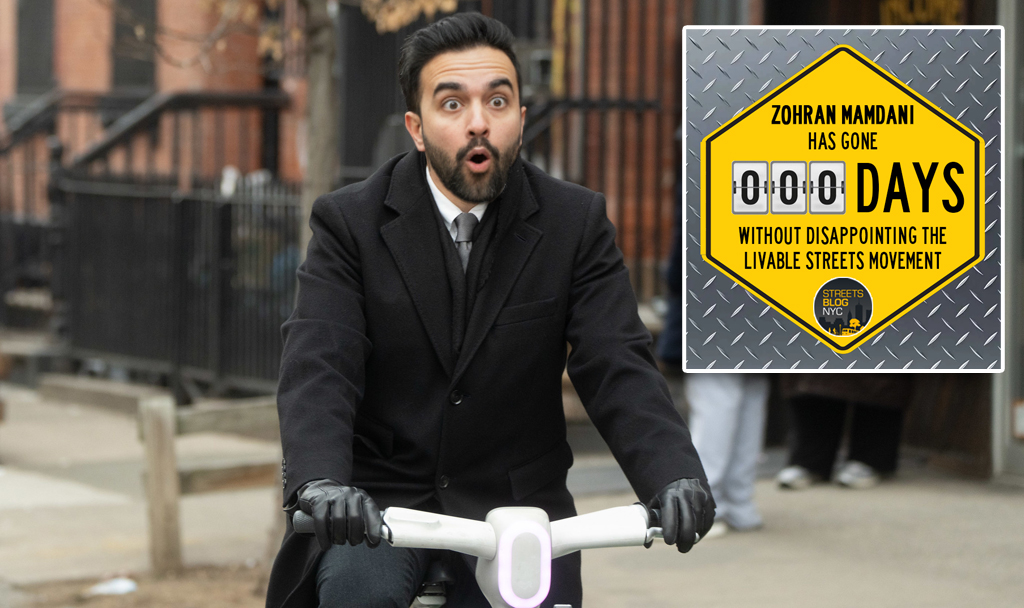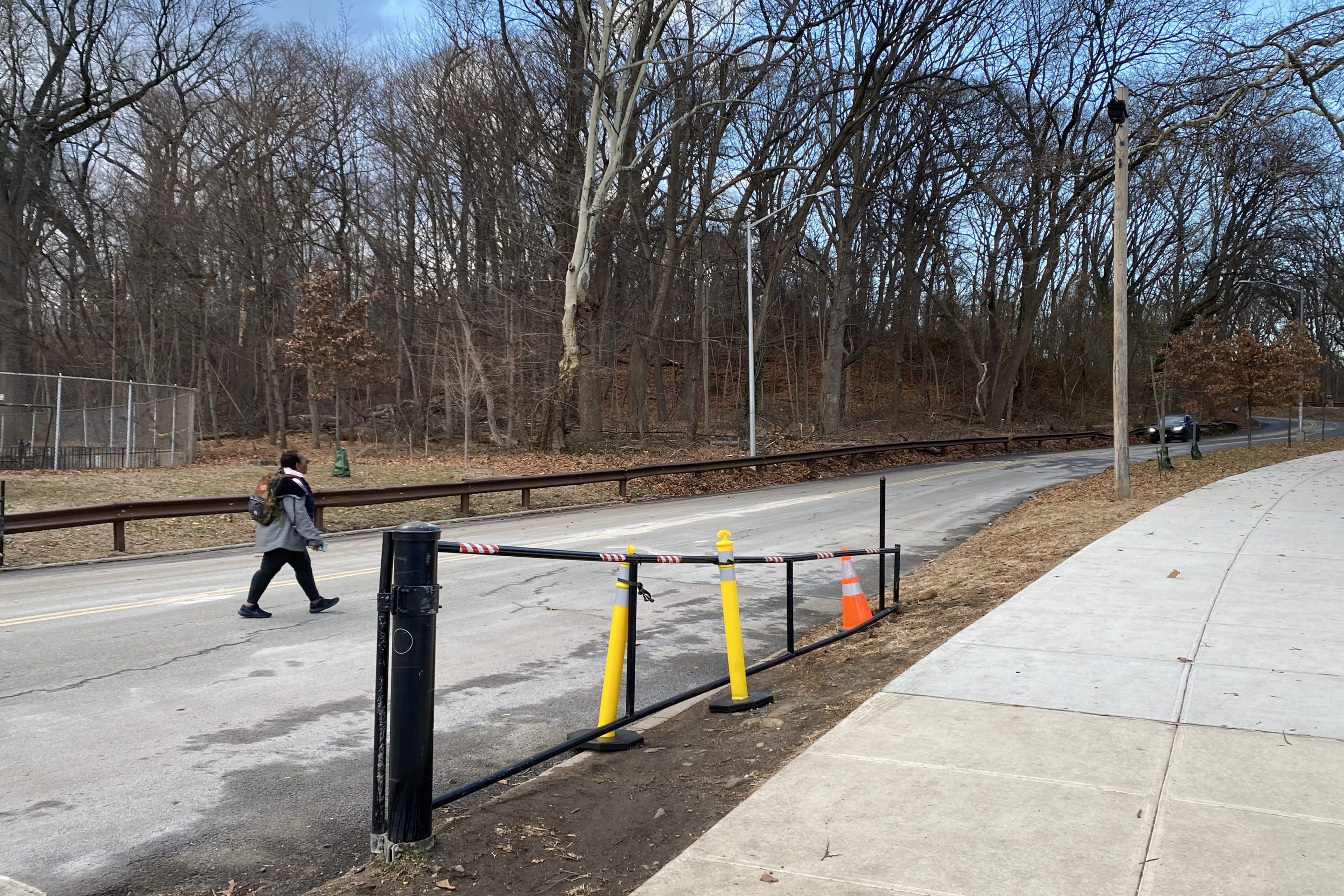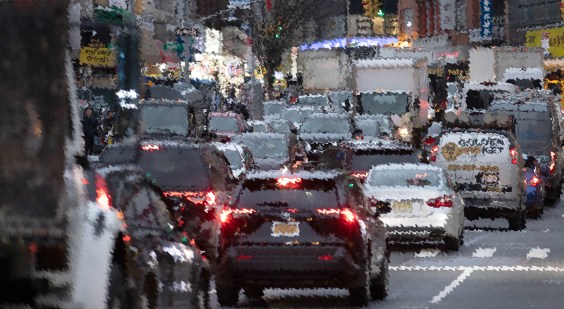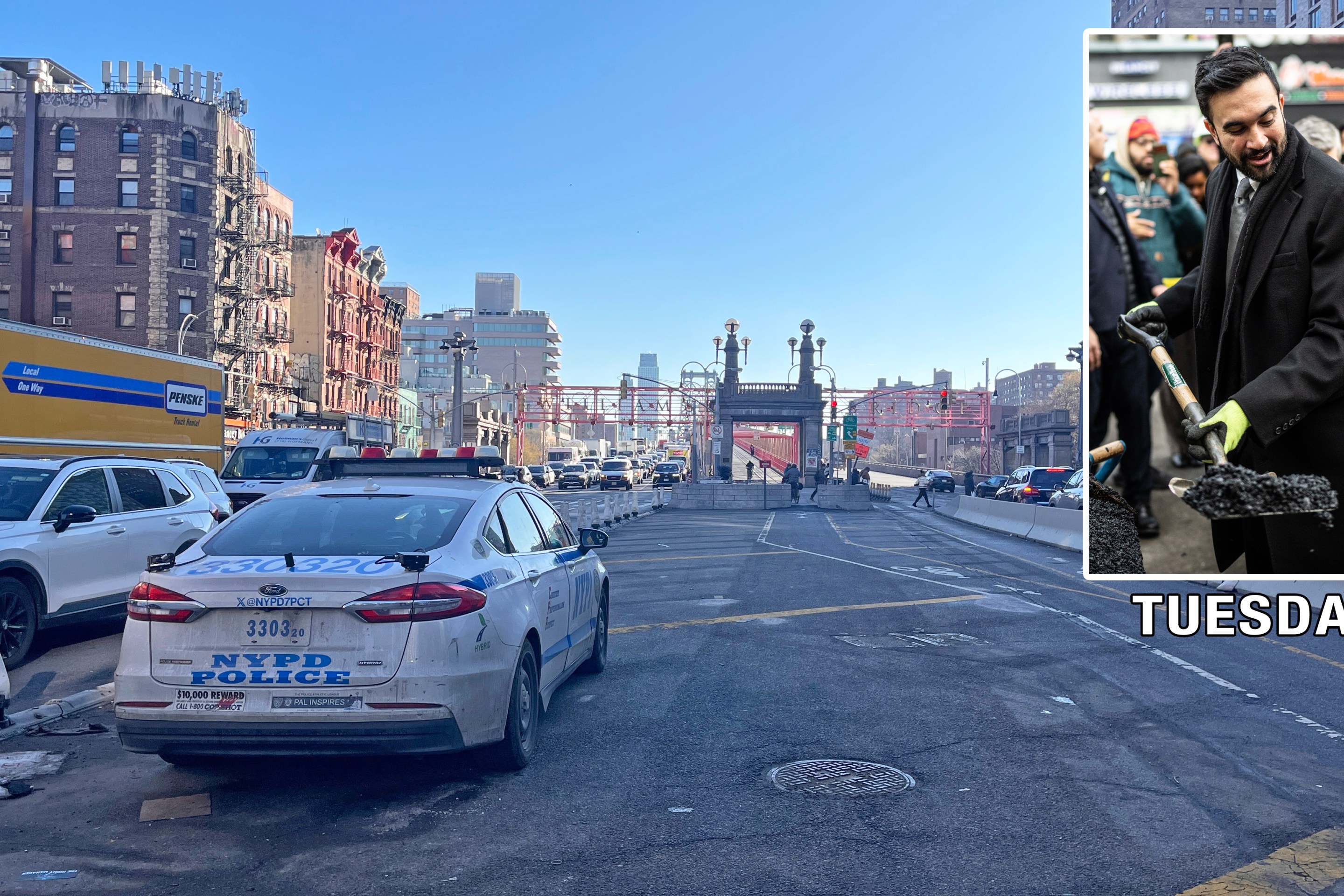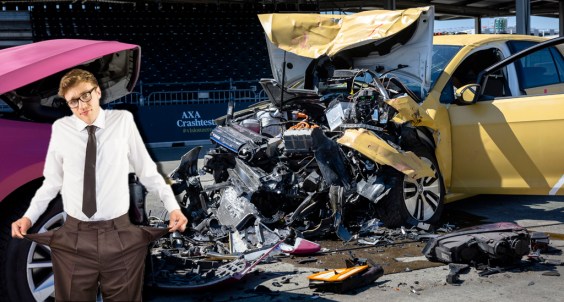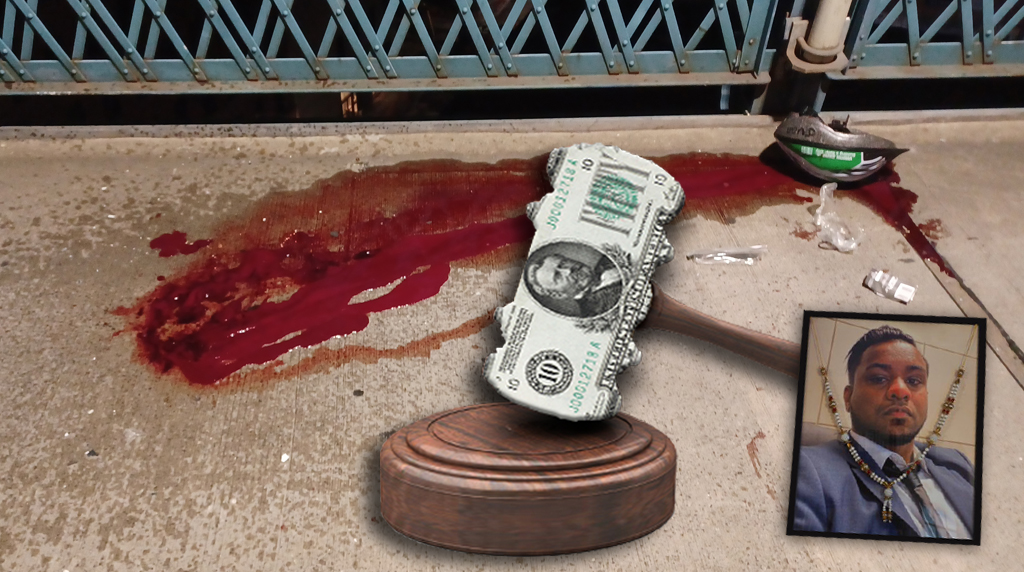The September 10 primary is just a few days away, and over the course of this grueling campaign the candidates have had plenty of time to lay out their vision for New York City's streets.
Transportation Alternatives and StreetsPAC both put together detailed candidate surveys and compiled responses from the leading Democratic candidates. For Streetsblog's guide to the Democratic mayoral hopefuls, we used those surveys and added material from the candidates' campaign policy books, their debate performances, and their track records as elected officials. (The Republican field was tougher to size up, with frontrunner Joe Lhota having an extensive record as a public official, and John Catsimatidis and George McDonald having none. However, you can get a decent sense of where they stand on streets and transportation issues from this recap of their August 28 debate, and this video sums up the Catsimatidis platform fairly well.)
Here's our overview of how these six Democrats have performed as public servants, as well as their positions and promises on key issues: street safety, bike infrastructure, buses, walkable development and off-street parking, and transit funding and road pricing.
High Points
Sal Albanese: Early on in the campaign, embraced reform of NYC’s dysfunctional bridge toll system, as well as repurposing streets for bike lanes and bus lanes.
Bill de Blasio: As a council member for the 39th District, led the delegation that won a significant expansion of car-free hours in Prospect Park in 2003; also supported the Ninth Street bike lane and road diet in Park Slope when the project encountered resistance in 2007.
John Liu: Voted for congestion pricing in 2008.
Christine Quinn: As City Council speaker, oversaw the votes approving congestion pricing in 2008 and the Bicycle Access Bill in 2009.
Bill Thompson: Issued a report as comptroller unmasking Albany’s declining contribution to the MTA operating budget [PDF].
Anthony Weiner: Came out in favor of lower parking minimums at the 2013 Tour de Queens; told the 2008 Tour de Queens, "We still have to make this city a much more bike-friendly town."
Low Points
Albanese: Supported mandatory bike helmets at a televised mayoral debate.
De Blasio: Voted against congestion pricing; made noise in the press against Times Square plazas and other street reclamation projects soon after meeting with opponents of the Prospect Park West bike lane in 2011.
Liu: Tried to stymie the Bicycle Access Bill as chair of the City Council transportation committee; released a fearmongering report about NYC bike-share as comptroller in 2012.
Quinn: Allowed motorhead City Council members to enact several bills pandering to car owners, including the five-minute grace period for parking scofflaws; promised to keep Ray Kelly as police commissioner.
Thompson: Right before the 2009 mayoral election, held a short campaign rally against Select Bus Service on Nostrand Avenue.
Weiner: Loudly fought against congestion pricing in 2008 and bridge tolls in 2009; promised to tear out the “f***ing bike lanes.”
Street Safety
Albanese: Says he would create a multi-agency task force on street safety, as well as increase NYPD crash investigation staffing and "sensible" traffic law enforcement. He also supports expanding pedestrian plazas and speed cameras near all schools and senior centers.
De Blasio: Laid out a "Vision Zero" approach, setting a goal of reducing NYC traffic fatalities to zero in a decade by quadrupling the number of Slow Zones (to 52) in four years, revamping at least 50 dangerous corridors and intersections each year, and focusing NYPD enforcement on speeding, failure to yield to pedestrians, and reckless driving. Also raised the excellent but unlikely idea of Albany giving NYC complete control over the number and location of speed cameras in the city.
Liu: Proposes dramatically increasing the staff of NYPD's crash investigation squad and expanding the Safe Streets for Seniors program. Also supported the city's successful push for speed cams. Wants a mandatory helmet law covering city-sponsored programs like bike-share.
Quinn: Joined with the mayor to push Albany on speed cameras, but did not join other City Council members in pushing for oversight of NYPD's crash investigations. With a campaign goal of halving traffic fatalities by 2021, says she would create a multi-agency working group to coordinate automated enforcement, police enforcement, street design, and traffic calming interventions.
Thompson: Transportation platform does not mention pedestrians or cyclists, and does not have a definitive street safety plank. Says laws against speeding and failure to yield to pedestrians should be enforced and wants to increase pedestrian crossing times.
Weiner: Says he wants to "increase the investment in pedestrian safety programs," specifically naming the Barnes Dance -- an exclusive all-way pedestrian crossing phase -- as a tool he would employ. Has not addressed NYPD crash investigations.
Bike Infrastructure
Albanese: Regularly rebuked the qualified support (or, in some cases, outright opposition) other Democrats have offered for bike lanes, noting that they have been installed with community input and are "great for the city." Would expand protected bike lanes in all five boroughs.
De Blasio: As public advocate, met with opponents of the PPW bike lane "to discuss bike strategy," commended DOT for halting a bike lane in Bay Ridge, and called the city's bike lane evaluations "biased" and "rubber stamps." As mayoral candidate, has been much more supportive of bike infrastructure, calling for 6 percent bicycle mode share of all trips citywide by 2020 and an expansion of bike lanes "deeper into the outer boroughs." Maintains that DOT outreach has been insufficient, a position he elaborated on in the StreetsPAC questionnaire.
Liu: Self-described "avid cyclist" says that protected bike lanes only make sense in Manhattan and that bike lanes in Brooklyn, Queens, and elsewhere are often empty and likely to be removed under his administration. Doesn't trust polls from Quinnipiac, Marist, and the Times that regularly show citywide support for bike lanes, and says recent bike lanes have been put in with "little to no community input."
Quinn: Says bike lanes are very popular in her council district, but that they are "clearly controversial" and "things you shouldn’t discuss at dinner parties." Also claimed DOT installed lanes without consulting elected officials and community boards, and took credit for codifying DOT's community board outreach. Has said bike lane expansion would continue under her administration, but with more community outreach.
Thompson: Railed against the Grand Street bike lane in his 2009 campaign, but now says he has no intention of removing bike lanes and is open to expanding the lanes if bike-share proves successful. Has also said during this campaign that some bike lanes are good while others are not, and that local communities "weren’t involved in the planning."
Weiner: Once told Bloomberg he would "hold a bunch of ribbon-cuttings tearing out your [expletive] bike lanes," now claims it was a joke. But just last month called bike advocates "policy jihadists" and repeated his intention to remove some bike lanes, such as the one near his brother's restaurant on Broadway that he claims is impeding deliveries and emergency response. But hey, he's a Citi Bike member.
Buses
Albanese: Aims to add 20 new Select Bus Service routes by 2018. Told TA [PDF], “I plan to lay the foundation so that major boulevards are designed holistically -- with more space devoted for pedestrian crossings, safe bicycling, Select Buses, and local bus service.”
De Blasio: Top priority in campaign platform is to build “world-class bus rapid transit” and phase in at least 20 BRT lines.
Liu: Campaign platform calls for an expansion of express, BRT, and SBS routes. Early in the campaign, said he supports expanding Select Bus Service "where appropriate." Also wants to bring new bus service to underserved outer-borough job centers, and has suggested financing it with revenue from real estate development.
Quinn: Aims to launch 10 new SBS routes in the next four years and add MetroCard kiosks at major bus stops. Stood by as separated bus lanes on 34th Street in her district were scuttled. Has recently mentioned busways along the Triboro RX route and on Staten Island's north shore as specific projects she supports.
Thompson: Policy book mentions creating "a true BRT system in under-served transit areas like Staten Island and Southeast Queens." At a low-profile press event in August, also promised more express bus routes and the restoration of bus service cut in 2010.
Weiner: Campaign platform does not mention buses, except to say that millions of New Yorkers "commute on a giant fleet of buses" and that while in Congress, he "obtained millions in funding" for projects including Bus Rapid Transit. At a forum on aging in July, said buses were a good option for seniors. Also said he supports expanding SBS.
Walkable Development and Off-Street Parking
Albanese: Told StreetsPAC: “As our city grows, it will become denser and transit-oriented development will become an even bigger necessity than it already is. That is why, as part of my comprehensive transportation plan, I have called for the elimination of the parking rebate and a change to the way developers are encouraged to contribute to their communities. Specifically, I want developers to contribute to the growth of mass transit options, instead of parking, when their developments add more to transit congestion than vehicle congestion.”
De Blasio: Says he would tax vacant land at higher rates and focus rezonings on areas of the city well-served by transit. Told StreetsPAC EDC must “fundamentally reevaluate” the amount of parking included in new developments. Supported the Atlantic Yards project as a City Council member.
Liu: Campaign web site mentions “green building standards” and reducing reliance on fossil fuels in the same paragraph, but not TOD or parking policy. As a City Council member in 2007, insisted on cheaper parking, and more of it, when Flushing Commons developers cut 400 spots from their plans, from 2,000 to 1,600 -- the amount mandated by NYC EDC -- for a signature project in a transit-rich area. Proposes the elimination of all EDC corporate subsidies.
Quinn: When developers wanted to exceed parking maximums at the St. Vincent’s Hospital site, stepped in to reduce the number of requested spaces -- though the final housing to parking ratio was still higher than would normally be permitted. Took no action as developers sought variances to build hundreds of parking spots in Hell’s Kitchen, and as the city fought residents in court to allow tens of thousands of spots in violation of a decades-old agreement to keep NYC in compliance with the Clean Air Act. Skirted StreetsPAC’s question about parking and development.
Thompson: Told StreetsPAC that EDC’s development strategies should include ”both transit-oriented development and publicly subsidized parking lots.”
Weiner: Volunteered at this year's Tour de Queens that he would work to reduce parking minimums, then reiterated the stance on the Transportation Alternatives questionnaire, saying: “I propose mandating buildings be built with fewer parking spots and more bike spots.” Parking reform was never incorporated into his “keys to the city” platform, though he does say the the city should build Section 202 housing, for seniors and the disabled, on hospital parking lots.
Transit Funding and Road Pricing
Albanese: Supports a toll system along the lines of Gridlock Sam Schwartz’s “Fair Plan,” putting a price on free East River bridges and lowering tolls on bridges away from the Manhattan core. Also proposed mobilizing mayors to advocate for greater transit investment from Washington.
De Blasio: Voted against congestion pricing in 2008. Supported Shelly Silver’s proposal to peg East River and Harlem River bridge tolls to the subway fare in 2009 during MTA funding talks. Recently said in televised debates that he does not support East River bridge tolls or “Mayor Bloomberg’s proposal” for congestion pricing. Campaign policy book says he would allocate city capital funds to the construction of BRT routes and lobby for increased federal investment in transit.
Liu: Voted for congestion pricing, then came out against the 2009 proposal for tolls on East River and Harlem River bridges. Now proposes East River bridge tolls on out-of-city residents only, which would not significantly affect congestion or raise much revenue for transit. Calls return of the commuter tax unrealistic, but wants Congress to provide more support for transit.
Quinn: Led City Council to pass congestion pricing in 2008. Recently has said that she still supports congestion pricing but won’t initiate a campaign for it as mayor. Opposed East River bridge tolls in the last televised debate.
Thompson: Opposes congestion pricing and bridge tolls. Supports weight-based vehicle registration fees and a commuter tax to fund transit.
Weiner: Vociferous, outspoken opponent of congestion pricing and bridge tolls.
